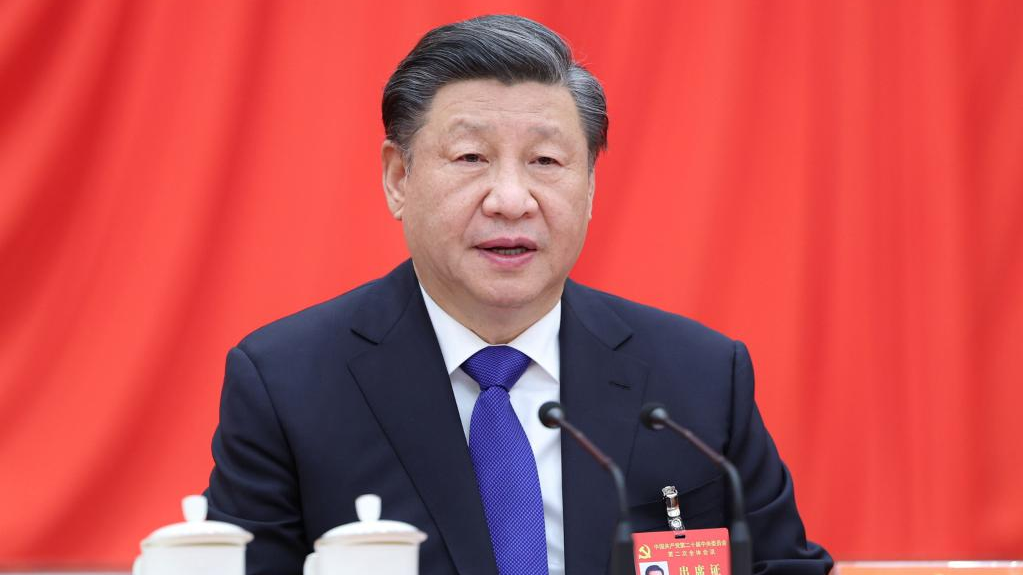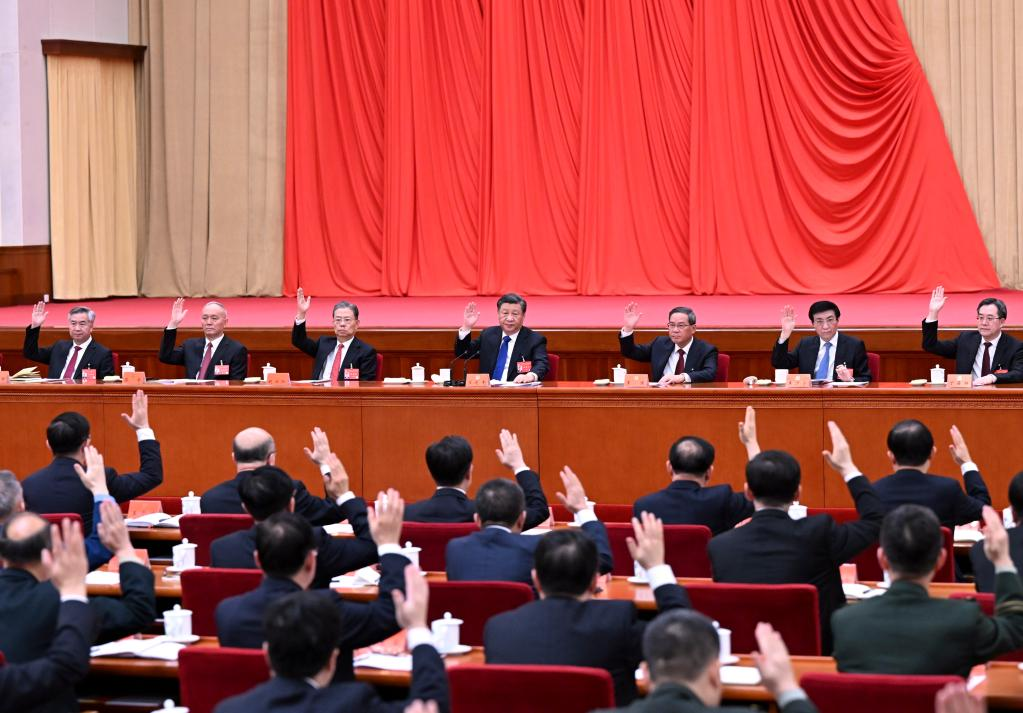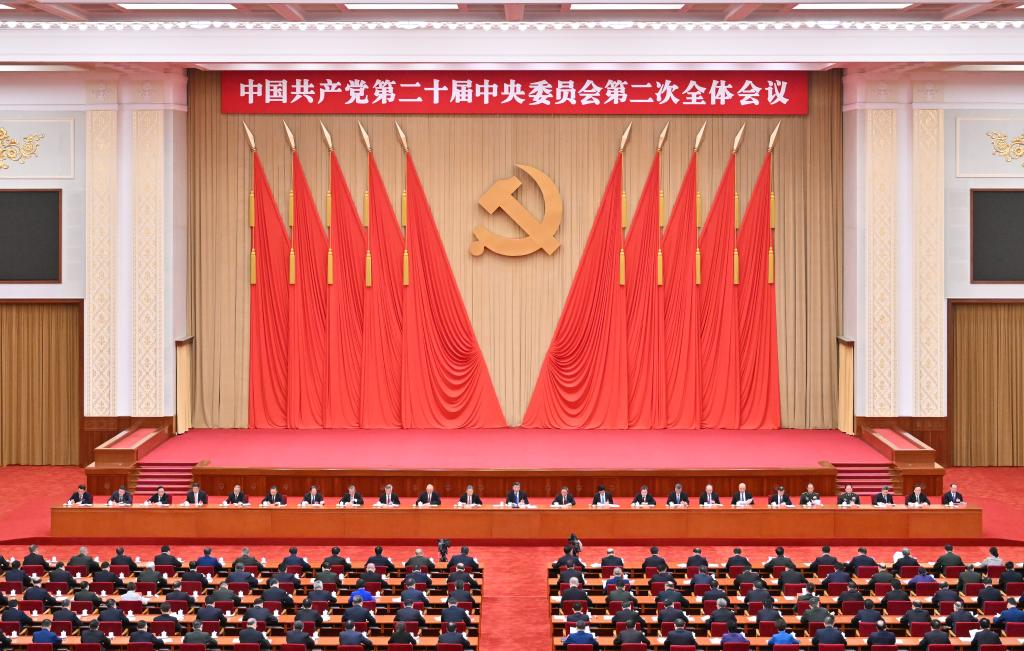
Xi Jinping, general secretary of the CPC Central Committee, makes an important speech at the second plenary session of the 20th CPC Central Committee in Beijing, capital of China. /Xinhua
Xi Jinping, general secretary of the CPC Central Committee, makes an important speech at the second plenary session of the 20th CPC Central Committee in Beijing, capital of China. /Xinhua
The 20th Communist Party of China (CPC) Central Committee issued a communique at the end of its second plenary session on Tuesday.
Xi Jinping, general secretary of the CPC Central Committee, made an important speech at the three-day session, which was presided over by the Political Bureau of the CPC Central Committee.
A total of 203 full members and 170 alternate members of the CPC Central Committee attended the session. Deputy secretaries of the CPC Central Commission for Discipline Inspection and leading officials of related departments were also present in a non-voting capacity.
At the session, the CPC Central Committee heard and discussed a work report presented by Xi, who was entrusted by the Political Bureau of the CPC Central Committee.
Lists of candidates
The session adopted a list of proposed candidates for the leading positions of state institutions, which is scheduled to be recommended to the first session of the 14th National People's Congress (NPC).
It also adopted a proposed candidate list for the leadership of the National Committee of the Chinese People's Political Consultative Conference (CPPCC), which is to be recommended to the first session of the 14th CPPCC National Committee.
The plenary session decided to recommend the two lists respectively to the presidium of the first session of the 14th NPC and the presidium of the first session of the 14th CPPCC National Committee, according to the communique.
The annual sessions of the NPC and CPPCC National Committee are scheduled to open on March 5 and March 4, respectively.
The first sessions of the 14th NPC and the 14th CPPCC National Committee are important for mobilizing the whole Party and Chinese people of all ethnic groups to build a modern socialist country in all respects and advance the great rejuvenation of the Chinese nation on all fronts, the document said.

Xi Jinping, Li Qiang, Zhao Leji, Wang Huning, Cai Qi, Ding Xuexiang and Li Xi attend the second plenary session of the 20th Communist Party of China Central Committee in Beijing. /Xinhua
Xi Jinping, Li Qiang, Zhao Leji, Wang Huning, Cai Qi, Ding Xuexiang and Li Xi attend the second plenary session of the 20th Communist Party of China Central Committee in Beijing. /Xinhua
Reform of Party and state institutions
According to the communique, the plenary session reviewed and adopted a plan for the reform of Party and state institutions which was proposed after soliciting wide opinions.
Xi delivered explanatory remarks on the draft plan at the session and the session also agreed to put part of the reform plan to the first session of the 14th NPC for deliberation in accordance with due legal procedures.
The plenary session pointed out that since the 18th CPC National Congress, the CPC Central Committee with Comrade Xi Jinping at its core has been making the reform of Party and state institutions a significant task in the drive to modernize the country's system and capacity for governance, according to the meeting.
Party and state institutions have been reformed to achieve a systematic and thorough restructuring of their functions, the session noted, stressing that the reform has provided a strong guarantee for achieving historic achievements and changes in the cause of the Party and the country and accumulated precious experience for further reform of Party and state institutions.
At the 20th CPC National Congress, important plans were made for deepening the reform of Party and state institutions, the communique pointed out.
The document underscored efforts to ensure that the Party's leadership over socialist modernization becomes more refined in institutional setup, more optimized in the division of functions, more improved in institutions and mechanisms, and more efficient in operation and management.

The second plenary session of the 20th CPC Central Committee is presided over by the Political Bureau of the CPC Central Committee. /Xinhua
The second plenary session of the 20th CPC Central Committee is presided over by the Political Bureau of the CPC Central Committee. /Xinhua
Coping with risks and challenges
The communique said the Political Bureau of the CPC Central Committee well implemented the spirit of the 20th CPC National Congress and the first plenary sessions of the Central Committee in face of the complicated international situation and heavy domestic tasks of advancing reform and development and maintaining stability.
As changes unseen in a century are accelerating, the world has entered a new phase of turbulence and transformation, the communique read, adding China has entered a period of development in which strategic opportunities, risks, and challenges are concurrent and uncertainties and unforeseen factors are rising.
To cope with the deep-seated issues in China's reform and development, the plenary session urged efforts to fully and faithfully apply the new development philosophy on all fronts and implement the decisions and plans of the Party Central Committee under the new phase of COVID-19 prevention and control.
It also called for expanding domestic demand, making China's industrial and supply chains more resilient and secure, fostering a world-class business environment that is market-oriented, law-based, and internationalized, preventing and mitigating major financial risks and ensuring that no systemic risks arise.
On improving people's livelihood, the communique urged efforts to implement an employment-first policy, safeguard the basic livelihood of families in straitened circumstances, tie up the social security network, make up the shortcomings of medical and health care system, especially the grassroots medical and health service system in urban and rural areas and improve the birth support policy system.
Calling for advancing rural revitalization across the board, the plenary session highlighted the importance of consolidating and expanding achievements in poverty alleviation and ensuring that people do not sink back into poverty in large numbers.